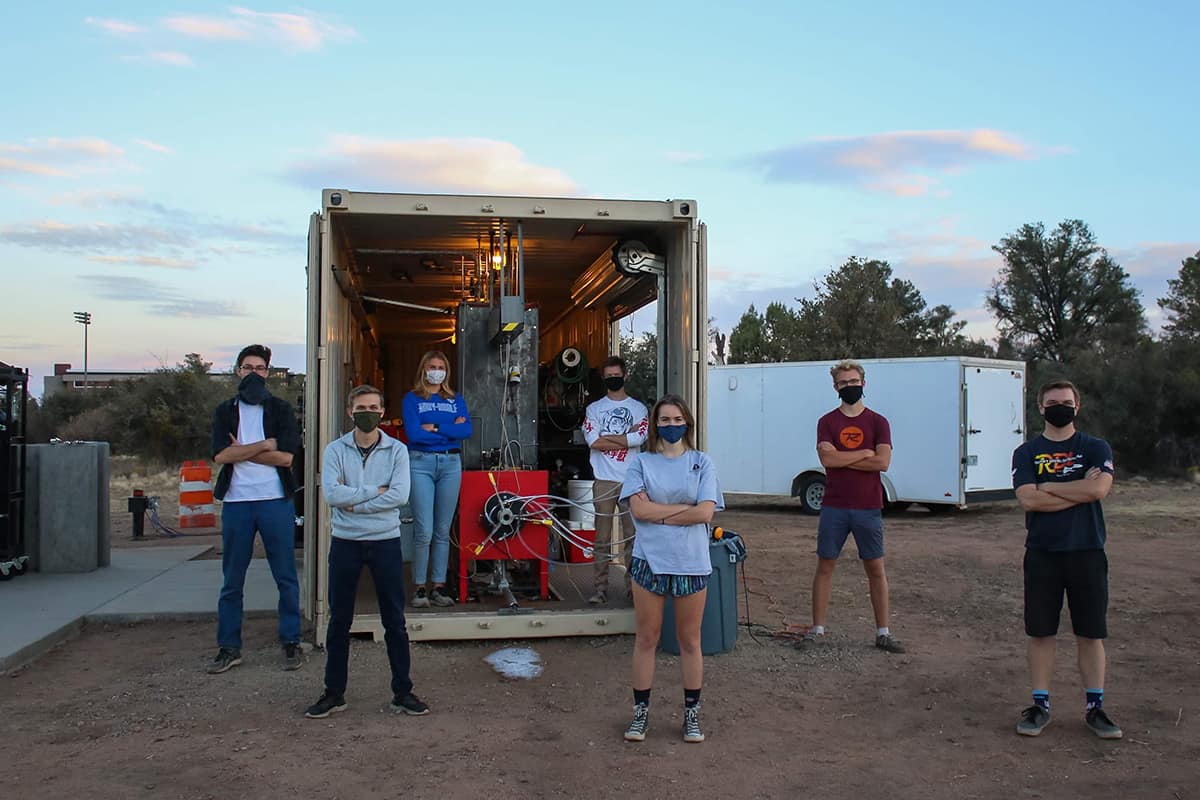Rocket Development Lab Fuels Student Success

Not many undergraduate students have the chance to design, build and test their own liquid oxygen-fueled rockets.
But thanks to Embry-Riddle’s Propulsion Laboratory & Rocket Test Complex, which is supported in part by philanthropy, students at the Prescott Campus have opportunities to work on solid, hybrid and liquid propulsion projects, including liquid flight vehicles.
“Our undergraduates are designing and building rockets comparable to many university graduate programs,” said Elliott Bryner, the lab’s director and an assistant professor of mechanical engineering. “We can do testing of rocket engines and motors. They are able to get hands-on with these design, test and build operations, really from day one.”
The lab and test complex have grown in the past three years, he said. The complex features three rocket test cells and a reinforced control room. The newest addition to this complex, Test Cell 3, is an enclosed liquid rocket test facility capable of handling rockets using cryogenic propellants.
“My core group of students right now is a bunch of sophomores,” Bryner said. “Our students have the opportunity to get in and take leadership roles. They make decisions and lead the teams, while I supervise.”
Purchasing equipment and fuel for rockets is not cheap, he said, so philanthropy, including donated equipment, supplies and funding, is critical to making these opportunities possible for students.
Max Kauker, a mechanical engineering student, said he initially got involved with the lab to socialize with fellow rocket enthusiasts, but it turned into more. He was part of the Zenith Propulsion project, a capstone team that tested a liquid bi-propellant rocket.
“Having access to these incredible resources has allowed me to network with many high-profile people in industry,” he said.
For students, it is a huge advantage to gain such real-world experience, said Bryner. It helps them land internships and jobs with aerospace and space companies, plus bolsters the university’s reputation for producing top-notch graduates.
Mechanical engineering student Zoe E. Brand said she came to the lab barely knowing the basics of rocketry and a year later, she is designing a chamber and testing a liquid rocket engine.
“The Rocket Development Lab has given me the opportunity to have hands-on experience with the liquid rocket testing stand on campus,” she said. “In the club, I have been able to apply the knowledge from classes to projects that a normal undergraduate student wouldn't have the opportunity of doing.”
Brand said the students mentor each other and get more of an idea, regarding what career paths they want to follow. Through her experiences at the lab, she’s developed an interest in engine design and testing.
“Since rocketry is hard...the RDL has created a strong learning culture to ensure that knowledge gets passed around,” she said. “So not only am I learning from others, I am also teaching others. This is a great way to force yourself to understand topics that you haven't been taught in class yet.”
It’s real world experiences like these that help Embry-Riddle students excel.
“We can talk in class about how a rocket works, but being able to take what they are learning in the classroom and applying that in the test cell requires material support and infrastructure,” Bryner said. “Philanthropy has really made a difference in making our program successful.”

 Melanie Stawicki Azam
Melanie Stawicki Azam